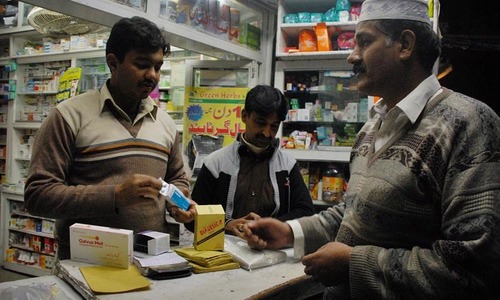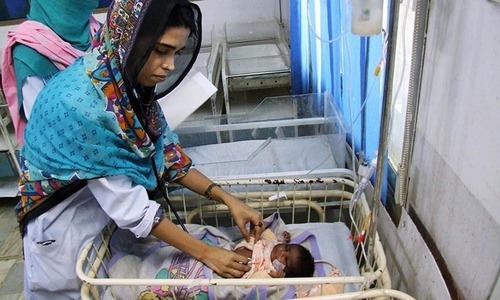LAHORE: Six multinational pharmaceutical companies have increased the prices of medicines by 15 per cent without approval from the Drug Regulatory Authority of Pakistan (Drap), triggering a controversy over the drug pricing mechanism in the country.
According to a senior official, the move has led to an artificial shortage of medicines. He said the companies which had increased the prices were GlaxoSmithKline (GSK), Sanofi-aventis, Abbott Laboratories, Novartis, Otsuka and Reckitt Benckiser. The medicines produced by the companies, he added, were used for the treatment of cardiac ailments, blood pressure, weakness, fever and as painkillers. Some of them were recommended to women during pregnancy.
He said that because patients were already suffering due to the high cost of drugs, a 15pc increase in their prices would only compound their problems.
The pharmaceutical companies, he explained, had directed their staff to charge customers as per the new rates, causing a shortage of many life-saving drugs and creating space for ‘mafia’ to move in and take advantage of the situation by fleecing patients.
Some pharmaceutical firms had directed their staff to retrieve unsold stocks from the market and update the prices, the official said.
“The companies have increased the prices on their own,” said Dr Mohammad Aslam Afghani, the Drap’s chief executive officer. “Drap had no role in this move.” He explained that Drap’s drug pricing committee had not raised the prices. “The multinational companies increased the prices after claiming that the Sindh High Court had granted them permission and later they got a stay order from the court,” he said, adding that Drap would challenge the decision and have the stay vacated.
In response to the controversial move, the Punjab government ordered the district administrations to thwart attempts to increase the prices through regulations. In a notice issued on Feb 8, Punjab’s chief drug controller, Dr Zakaur Rehman, directed all drug controllers, deputy drug controllers and drug inspectors to frequently visit the markets and prepare a list of companies that had increased their prices.
“You are further directed to probe the issue of non-availability/acute shortage of some potentially required medicines in the market and furnish the list of non-available/less available drugs sold at more than MRPs,” he said.
The notice also named the six multinational pharmaceutical companies which had increased the prices.
One of these companies, GSK, wrote a letter to wholesalers and cited the reasons behind the price hike. A copy of the letter is available with Dawn.
The letter said that GSK had filed several cases for the hardship price increase of certain products with Drap in 2012.
“As three years lapsed and the cases remained pending despite the statutory assurance by Drap to provide relief through the Drug Pricing Policy 2015, we were constrained to seek enforcement of hardship price increase through the Sindh High Court,” it said.
The company informed the wholesalers and distributors that prices of drugs including Panadol 500mg, Panadol Extra, Panadol CF, Panadol drops, Actifed P Elixir, and Actifed DM cough syrup had gone up.
Senior pharmacist and legal expert Noor Mohammad Mahar condemned the price hike and said it had created serious problems for poor patients.
He said the companies in question were already earning good profits from their products.
Mr Mahar held the Drap’s senior officials responsible for the hike. “They are behind this move. They (also) did nothing when these multinational companies increased prices by 15pc in 2013.”
Aamir Shafaat Khan in Karachi adds: The multinational companies had increased the prices by up to 50pc over the last one month, said chief of the Pakistan Chemists and Druggists Association (PCDA), Riyaz Hussain.
Talking by phone from Peshawar, he said local manufacturers of medicines would also increase the prices of their products.
“With decrease in the prices of petroleum products, various commodities are becoming cheaper. How can the production cost of these MNCs go up,” he wondered.
Mr Hussain said the PCDA condemned the hike in drug prices and would urge the government to waive general sales tax on medicines.
The association held a demonstration outside the Peshawar Press Club on Wednesday, demanding cut in drug prices.
Published in Dawn, February 11th, 2016













































